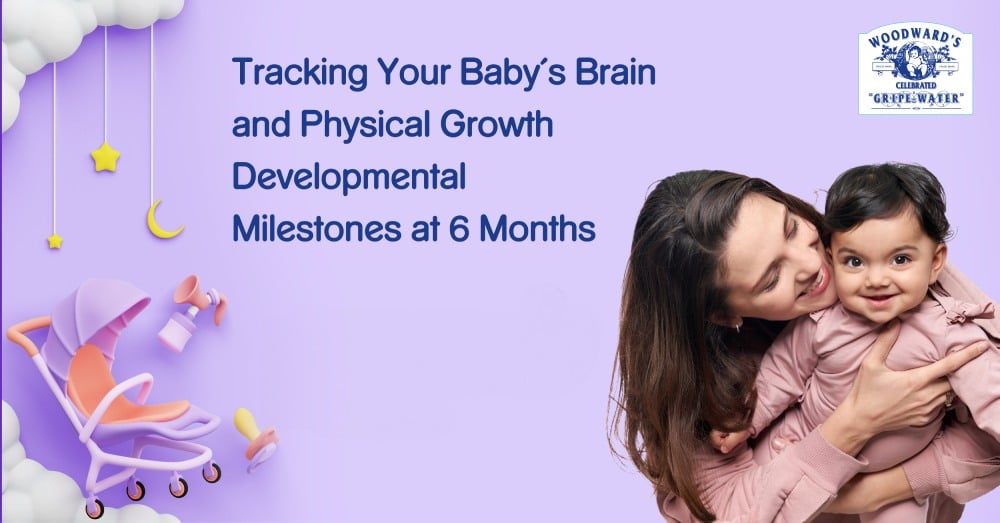Tracking Your Baby’s Brain and Physical Growth Developmental Milestones at 6 Months

At 6 months, your baby is growing and developing at an astonishing rate. From reaching new milestones in their physical abilities to building a foundation for their brain development, these first six months are full of exciting changes. It is vital to understand this phase, so let’s take a look at the key developmental milestones you can expect to see in your baby at the 6-month mark.
From their increasing mobility and curiosity to their blossoming communication skills, we will explore the wonderful journey of tracking your baby’s growth. Whether it’s their first attempts at sitting up or their babbling becoming more intentional, understanding these milestones will help you support your baby’s development and celebrate their achievements.
Milestones in Brain Growth Development
- Discovering Object Permanence
Around the age of six months, infants reach an important cognitive milestone known as object permanence. This is the stage when your baby begins to grasp the concept that objects and people continue to exist even when they are out of sight. This realization marks a significant step in their cognitive development and as a parent you play a crucial role in supporting and encouraging their cognitive development.
You can encourage this understanding by engaging in interactive play activities. Games like peek-a-boo and hide-and-seek can be both entertaining and educational and will help your baby to solidify their newfound awareness of object permanence.
- Improved Memory
At six months, your baby’s memory is developing rapidly. They can now recognize familiar faces, particularly those of immediate family members. To nurture this progress, consider integrating memory-building activities like building blocks and ready into your daily interactions and routines. These simple yet engaging activities can further enhance your baby’s memory skills.
- Curiosity Blossoms
During these times your baby’s curiosity starts to bloom. They show a growing interest in exploring their surroundings, from toys and household objects to different textures and sounds. To support their development, ensure you create a safe and stimulating environment that encourages this natural exploration and learning process.
- Babbling Brilliance
At this stage, your baby’s babbling becomes more purposeful and diverse. They might explore a range of sounds and syllables. Encourage this linguistic journey by engaging in conversations with them, even if they can’t reply with words yet. It’s a vital step in their language development.
- Recognition of familiar voices
As your baby grows, they become more attuned to familiar voices, particularly those of their primary caregivers. Strengthen this precious connection by engaging in social games and activities that encourage social interaction. It’s a heartwarming journey of recognition and attachment during their early development.
Milestones in Physical Growth Development
- Achieving independent sitting
Around six months, babies often achieve independent sitting, with or without support. So as a parent encourage this milestone by sitting with your baby and providing engaging toys to play with. It’s a crucial step in their physical development, strengthening their core muscles and fostering their growing independence.
- Reaching and grasping
Enhanced hand-eye coordination around this age empowers your baby to purposefully reach for and grasp objects. Stimulate this skill by offering an array of textured toys and objects for them to explore. It’s a pivotal stage in their physical development, refining their motor skills and curiosity.
- Rolling over
By this stage, your baby often master’s the skill of rolling over, transitioning effortlessly from tummy to back and vice versa. So, you can foster this development by incorporating regular tummy time sessions, which play a vital role in strengthening your baby’s neck, back, and core muscles.
- Feeding milestone
This is a stage where the introduction of solid foods takes place. Make sure to support their transition by offering age-appropriate finger foods, encouraging exploration, and nurturing their budding independence. This phase marks an essential step in their nutritional and developmental journey.
Keeping tabs on your baby’s developmental milestones at six months is vital for their well-being and future growth. These milestones offer valuable insights into their cognitive and physical abilities, helping parents and caregivers track progress and spot any potential concerns. By grasping these milestones and showering your baby with love and care, you can create a nurturing environment that supports their healthy growth and development.
